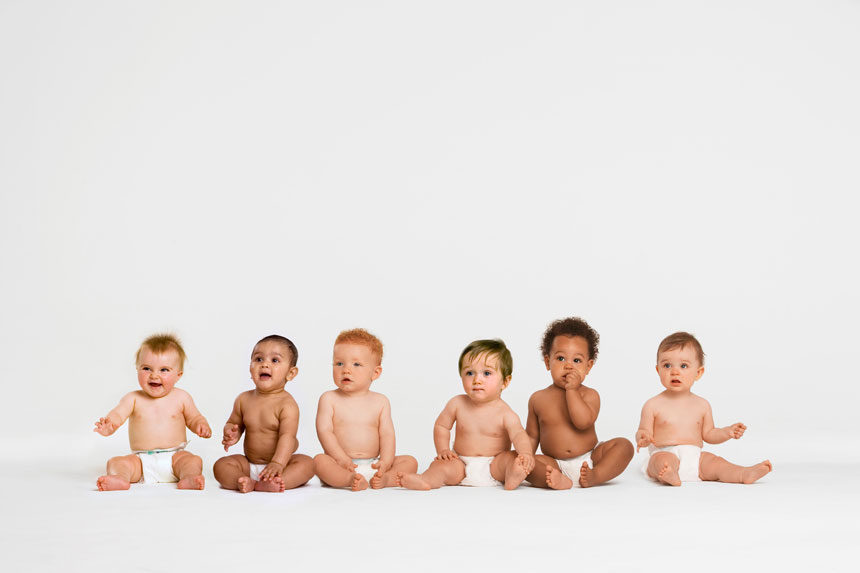Managing editor and logophile Andy Hollandbeck reveals the sometimes surprising roots of common English words and phrases. Remember: Etymology tells us where a word comes from, but not what it means today.
Babies, toddlers, tots, tykes, kids, children, juveniles. The English language has quite a few words for the ankle-biting monsters — I mean beautiful angels — who keep our bloodlines going. Many of these words, however, didn’t rise to prominence until the 12th century or later — sometimes much later. Before then, speakers of Old English — the earliest known form of English, which began a meaningful shift after the Norman Conquest of 1066 — had other ways of pointing out their offspring. Though those words are gone in one sense, they still have a resonance today.
First, there’s offspring, originally ofspring, literally “those who spring off,” which, as you can see, has undergone very little change over the last millennium and a half. This was and is a general, collective term for children.
Then there’s geongling, whose modern equivalent is youngling, not an unheard-of word today, but not terribly common outside the Jedi temple. Along the same morphological lines, because children are little, they were also called lytlings (or littlings), a word also used derogatorily toward someone deemed unimportant.
And of course there’s child, which in Old English was cild. For centuries a cild was either a tiny human still in the womb or a newborn — in other words, a four-year-old, say, would be too old to call a cild. In the late Old English period, though, the age at which someone could still be called a cild grew. (A similar growth in the etymological precursor of infant is how the military ended up with infantry.) The original sense still survives in the euphemism “with child”— as opposed to, I guess, “with fetus” — for “pregnant.”
We don’t start finding child being used to describe the relationship between a parent and offspring, regardless of the child’s age, until the late 12th century.
In the beginning, the plural of cild was just cild, in the same way that sheep is both singular and plural. Probably to avoid confusion, a suffix was added to make a new plural — cildra or cildru depending on the word’s grammatical purpose in the sentence. In the 12th century, making it early Middle English, it was pluralized again to become children, probably modeled after words like brethren and oxen. This makes children technically a double plural.
And finally, there’s the word for “child” that is hinted at in this article’s title: In Old English, a thing that is borne or carried was called a byrðen. And because a baby is borne by its mother before it is born (and those two words are etymologically related), a child, too, was sometimes called a byrðen.
That odd-looking ð (Đ as a capital letter) is called an eth; it’s a letter that no longer exists in the English alphabet. The eth represented the th sound that you hear in words like wither and them, as opposed to the “harder” th in words like thing and faith, which was indicated in Old English with another letter lost to our language, the thorn (lowercase þ, uppercase Þ). (It should be noted that the eth died out before the thorn, so that by the time of the Norman Conquest, the thorn was used for both versions of the th sound.)
As the eth and then the thorn faded out, they needed to be replaced in written text. How they were replaced depended on a few factors, one of which being how people actually pronounced the word. The change in spelling then, over time, also effected the way the word was pronounced.
Normally, the eth became a th: The Old English feðer became feather, for instance. Sometimes, though, an eth was replaced with a d, or the spelling continued to shift and a th was replaced with a d. For example, the Old English morðor (and here I can feel Lord of the Rings fans gasping) transitioned to morþer, which, beginning in the 12th century, became murther and then murder. (You can find both murder and murther in Shakespeare.)
This is what happened to byrðen, too — a thing borne or carried became a burthen and then a burden. The “child” sense, however, fell away over time because, of course, having children stopped being a burden, right?
Featured image: Shutterstock
Become a Saturday Evening Post member and enjoy unlimited access. Subscribe now




Comments
This is another interesting feature, of course. My ‘son’ is a Boston Terrier, and even he can be a burden occasionally, but in these terrible times he’s wonderful company overall. I was supposed to attend a ‘bride and bride’ Basset hound wedding later this month, but because everything’s SO f’d up, it’s been postponed until we don’t know when!
These are friends of the other people I know (also friends) whose ‘bride and groom’ Basset wedding I attended some years back. I mentioned it in your column, Bob Sassone’s (I think) and was chastised for it in one of them, so just a lite mention here. It’s not considered weird in my state, and with the way everything is, doesn’t rate a ripple of concern with me at all. Girls (and their human guests) just want to have fun, but you can forget about that now!
Interesting on all the different words for children here. I noticed ‘brat’ wasn’t included, but that’s fine. What I don’t think is fine is almost 95% replacement of the words ‘child’ or ‘children’ with the word ‘kid’ or ‘kids’. It’s not a new word at all, but decades ago it was not being used as a complete replacement word for the previous. It has though in the last 30+ years of America’s descent into ghettoization.
Thanks for the link to the infant/infantry column from August 2019. That seems like it was much longer ago.